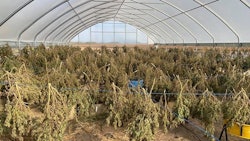Next month is shaping up to be a crucial time for the hemp industry as must-pass federal funding bills will likely include provisions easing the industry's regulatory burdens. These bills will focus on the U.S. Department of Agriculture (USDA), Food and Drug Administration (FDA), and Drug Enforcement Administration (DEA) regulations, Jonathan Miller, general counsel for industry association Hemp Roundtable, tells Hemp Grower.
USDA Interim Final Rule
Lawmakers plan to use appropriations to address provisions in the USDA's interim final rule governing hemp production. Groups such as Hemp Roundtable and National Industrial Hemp Council have expressed concerns with the rule, including that crops must be tested at DEA-certified labs and tested for THC levels no more than 15 days before harvest.
On Nov. 10, in the first step to address such issues, the Senate Appropriations Committee issued a report calling for the USDA to change provisions that lawmakers say "create roadblocks for farmers." These "roadblocks" include "requiring an unrealistic timeframe for testing, the use of Drug Enforcement Administration registered laboratories, the conversion of THCA into THC, a sampling of only flowering tops, and an arbitrary negligence threshold of 0.5%." Farmers face a “negligence threshold” of 0.5% THC, meaning that if they produce hemp over that limit three times in a five-year period, they will not be allowed to grow hemp for the following five years.
The committee also directed the USDA to propose amendments "to ensure that any final rule is based on science and will ensure a fair and reasonable regulatory framework for commercial hemp production in the United States."
This report is a step in the right direction, Miller says. The language serves as "a clear, unmistakable signal from Congress to this new incoming USDA that this IFR [interim final rule], as it's currently written, is not acceptable and it needs to be broadened, and USDA has to work closely with industry to come up with a final product that is better for farmers."
DEA Interim Final Rule
Miller and the Hemp Roundtable are also working with Senators on appropriations language that would block enforcement of the DEA’s interim final rule or protect hemp crops during processing with language that would prevent the DEA from requiring THC testing at that point in the supply chain.
The DEA's IFR on hemp has caused an uproar among industry members and lawmakers. Many have interpreted it to regulate products derived from lawful hemp — specifically, including intermediary hemp and waste hemp materials. Those products often experience temporary spikes in TCH content above the legal 0.3% limit, but they are either amended before reaching the final product or not used at all.
One of those lawmakers, Sen. Jeff Merkley (D-OR), co-authored a letter in late October criticizing the DEA for this standard. Merkley also happens to be the Senate Appropriations subcommittee's ranking member with jurisdiction over agriculture, the Subcommittee on Agriculture, Rural Development, Food, and Drug Administration and Related Agencies.
But Miller says this might be a difficult lift. The problem is that such language would touch on several committees' jurisdiction and would need agreement from leadership in each of them if this is to work.
Continuing Resolution on Hemp Pilot Projects
Miller says that Senate appropriators are also working on language to further extend the state hemp pilot projects. He says that the problem is that the original extension ends Sept. 30, 2021, which is the middle of the hemp harvest season. To remedy this, the Senate Appropriations Committee is working on a provision that would extend the pilots until January 2022.
FDA CBD Regulations
The Senate Appropriations report also asks the FDA to temporarily back off its enforcement of CBD until more of a regulatory structure has been put in place. "Within 90 days of enactment of [the appropriations bill], the FDA shall issue a policy of enforcement discretion with regard to certain products containing CBD meeting the definition of hemp …. Such enforcement discretion shall be in effect until the FDA establishes a process for stakeholders to notify the FDA of use of CBD in products that include safety studies for intended use per product and makes a determination about such product."
Miller says that this language is an important step to address the FDA's position that it is illegal to sell ingestible hemp-derived CBD products. "I'm encouraged by it because … it demonstrates bipartisan congressional support" for the sale of CBD products. However, he doubts that this will have much immediate effect because the report language is not binding. The FDA has also historically not paid much attention to such Congressional pronouncements.























